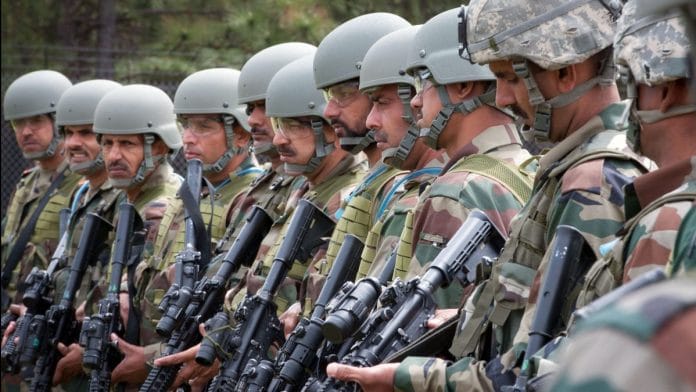For repetitive cycles of strategic behaviour to be broken, there either must be a ‘Black Swan’ event, or the infusion of a radically different strategy that is accompanied by a raised-risk component.
After having reflected on the origins of Pakistan’s proxy war in J&K, it is time to fast-forward to the present.
A thoughtful piece on the downside of India’s current strategy of raising costs for Pakistan’s continued support to the proxy war in J&K by an accomplished practitioner-scholar merits a response. This is because we seem to be sceptical about the current strategy as short-term costs seem to be high even though past strategies have repeatedly floundered.
Rather than debate selected issues from the article, it is more appropriate to focus on India’s attempts to forge a flexible strategy of deterrence by denial against an adversary that punches well above its weight by exploiting the chameleon nature of contemporary conflict and geopolitics.
Pakistan’s irrational strategic behavior stretches across the political and military spectrum, influenced in no small measure by jihadi and salafi extremism.
However, there is a sliver of rationality that emerges when one looks at the Pakistan armed forces’ war-fighting strategies across the spectrum of conflict. Adding to the confusion are small and rational segments of Pakistan’s beleaguered diplomatic corps and civil society that harbour hopes of a rapprochement with India — I would call these red herrings that have deflected much effort of Indian diplomacy in an unproductive direction. Except for the very recent diplomatic offensive that isolated Pakistan before India carried out its much-publicised surgical strikes, much effort has been frittered away in ‘back-channel diplomacy.’
Let us, for one moment, assume that the much-touted ceasefire of 2003 is restored along the Line of Control (LoC). What kind of guarantees can India extract from the Pakistan army under an aggressive chief of army staff like Gen Bajwa to rein in jihadi outfits like Jaish-e-Mohammed (JeM) or Lashkar-e-Taiba (LeT) after he has clearly indicated that he subscribes to the segregation of the ‘good terrorist from the bad one’ — in other words, an endorsement of terrorism as a strategic tool for Pakistan?
Will it abandon its obsession to force a secession of Kashmir as an irrational expectation of getting even with India for 1971, Siachen and Kargil? Will there be an attempt by India’s political establishment to shift goal posts and insist on engaging with the Pakistan army in an integrated manner to gauge the seriousness of the Pakistan army in restoring peace along the LoC? When I talk about an integrated approach, I am referring to rectifying the follies of the past, when PM Indira Gandhi failed to include the views of the Indian military while negotiating the Simla Agreement. An institutional reluctance to reflect on history will condemn us to replicate the follies of the past.
For repetitive cycles of strategic behaviour to be broken, there either must be a ‘Black Swan’ event, or the infusion of a radically different strategy that is accompanied by a raised-risk component. Kargil, the Parliament Attack of 2001, and the 2008 Mumbai terrorist attacks were all ‘Black Swan’ events of varying intensity. Yet, they did not break the cycle of Pakistan’s current proxy strategies because India’s strategy of deterrence by denial, accompanied by a mixture of direct and back-channel diplomacy, was not robust enough to induce a behavioural change. India’s rise as a responsible and restrained power must not be accompanied by its willingness to absorb punishment, both in terms of attrition to security forces and civilian populace.
‘Willing and capable’ is a phrase that is commonly used these days in strategic debates as Europe grapples with the possibility of re-inventing deterrence strategies to cope with the possibilities of increasing Russian resurgence and coercion in the region. ‘Willing’ deals with intent, resolve and the propensity to take risks, while ‘capable’ deals with state capacity to orchestrate all tools of statecraft from a focused national security perspective to deter an irrational adversary. In a recent editorial in the Indian Express, Sushant Singh rightly argues that India must guard against wasting strategic energy on Pakistan and focus on China.
In doing so, he is merely pointing at a lack of state capacity to address multiple national security challenges concurrently, and a propensity to politicise national security issues to the detriment of furthering comprehensive national security. Putting it bluntly, great powers largely manage to gather internal consensus on matters related to national security and forge ahead with strategies that are refined over years for effect. Contrast India’s fractured views with a recent articulation by Admiral Harry B. Harris, the commander of the US Pacific Command, on seven direct and six non-traditional national security threats to the US and the need to develop integrated response strategies to address them.
I argue that while the operational framework (army-centric) for dealing with Pakistan’s continued support to the proxy war is relatively robust, we may need to reflect on the need to make the coercive element more credible. I am staying away from ‘punishment and decapitation strategies’ as these have not been debated much in India, but they merit serious debate, particularly in the realm of targeted elimination of terrorist leadership. All I am suggesting is that it is time to fuse our growing ground, aerial and space-based surveillance capabilities, coupled with precision and better humint, to see whether we can raise costs for infiltration without abandoning our core principles of restraint, or being shackled by our traditional apprehension of the escalation ladder.
 Arjun Subramaniam is a retired IAF Air Vice-Marshal, and currently a visiting fellow at Oxford University.
Arjun Subramaniam is a retired IAF Air Vice-Marshal, and currently a visiting fellow at Oxford University.






